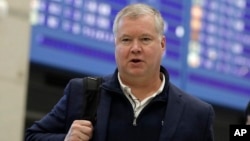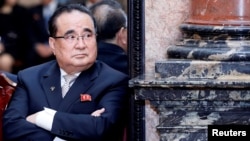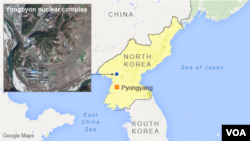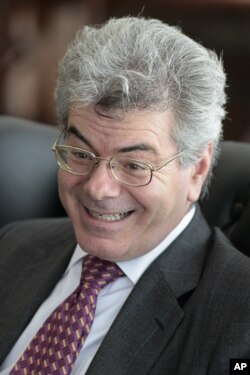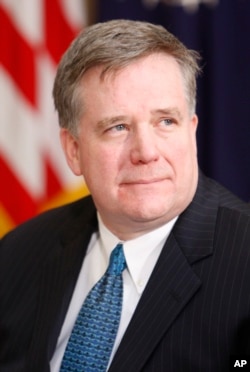U.S. Special Representative for North Korea Stephen Biegun and North Korean official Ri Su Yong, chairman of the Foreign Affairs Committee of the Supreme People’s Assembly, crossed paths in Beijing this week, sparking speculation that they may be holding a back-channel discussions after the breakdown of the Hanoi summit in February.
On Tuesday, Biegun met with Chinese Vice Foreign Minister Kong Xuanyou, who is the special representative on Korean peninsular affairs, after his arrival in Beijing. Ri stopped in the city Tuesday en route to Laos.
“It would suggest to me that the possibility of the U.S. and North Korea interactions may be back on the table at least [through] some sort of back-channel,” said Ken Gause, director of the International Affairs Group at the Center for Naval Analyses. “And China may be providing the venue for this back-channel discussion.”
However, Gary Samore, the White House coordinator for arms control and weapons of mass destruction during the Obama administration, suggested Biegun and Ri “were simply both there at the same time to have their own conversations [with China].”
Something from China
The U.S. wants China to enforce sanctions and to nudge Pyongyang into resuming talks with Washington, while North Korea wants China to relax sanctions enforcement. Relaxed enforcement would mean “that North Korea could continue to obtain … important commodities,” according to Samore.
China is North Korea’s largest trading partner and has not vigorously enforced sanctions, according to a U.N. report issued early this month.
The Beijing visits by Washington and Pyongyang came after each side signaled discontent with the other’s position. On March 22, Pyongyang withdrew its officials from the inter-Korean liaison office in Kaesong. That came a day after the U.S. Treasury Department issued sanctions on two Chinese shipping companies that it claimed to have helped North Korea evade sanctions.
According to John Feffer, director of Foreign Policy Focus, Washington and Pyongyang have resorted to sending signals as they attempt to change each other’s position after they failed to reach a denuclearization deal at the Hanoi summit. At the Hanoi summit, the U.S. denied North Korean leader Kim Jong Un’s demand to lift sanctions in exchange for dismantling the Yongbyon nuclear facility.
“Talking hasn’t really gotten very far,” Feffer said. “Pyongyang has stated its position about step-by-step negotiations. This hasn’t gotten the U.S. to budge from its all-or-nothing position. So it has fallen back on signaling through actions.”
“Signaling, especially hard-line signaling,” Gause said, “seems to resonate with the other side much better than soothing words or positive actions.”
“Both sides here believe that they can get their point across by increasing pressure on the other side. The United States does it through sanctions. North Korea does it through threats and aggressive behaviors,” he added.
Following North Korea’s pullout from Kaesong, President Donald Trump tried to reverse the Treasury sanctions with a March 22 tweet saying he had “ordered the withdrawals of those additional sanctions” which threw Washington into confusion.
Shortly after, Pyongyang returned its officers to the Kaesong office.
Trump’s tweet was explained later by a U.S. official to mean that no additional sanctions will be imposed on North Korea while current sanctions including the latest announced sanctions will remain. But there have been press reports that indicate Trump meant to reverse the sanctions that the Treasury Department issued Thursday but was persuaded against it.
“The North Koreans are obviously unhappy about the results of Hanoi,” Samore said. “So they’re trying to send signals and messages to both Washington and Seoul they are not prepared to tolerate the current stalemate forever.”
“That was absolutely a signal by North Korea to ramp up the pressure on the United States,” Gause agreed, “and that maybe what sparked the Twitter [message] from the president [trying to express], ‘Hey, slow down here. Let’s see if there’s a way forward here.’”
Dennis Wilder, the National Security Council’s senior director for East Asia affairs during the George W. Bush administration, thinks China cautioned North Korea not to go back to a provocative posture.
“I think the Chinese are telling them to be careful with the Trump administration, that they’re telling them not to provoke,” Wilder said. “And I think the North has to listen to that because of the economic lever the Chinese has over the North Koreans.”
Samore thinks Trump, attempting to reverse sanctions, and Kim, sending back his staff, demonstrated that they each want to keep communication open.
“Both Kim Jong Un and Trump want to preserve the diplomatic process they have begun,” Samore said. “Both sides are showing signs of unhappiness and trying to create a situation to strengthen their bargaining position. But at the end of the day, neither wants this process to collapse, which would mean resumption of testing and resumption of joint U.S.-[North Korea] exercises.”
Wilder thinks Trump’s tweet suggests his penchant for maximum pressure has lessened even though that may run counter to hardliners within the administration.
“I think it’s quite clear that the president is not as big of a fan of sanctions as his national security adviser and others within the administration right now,” Wilder said.
After Trump’s tweet, White House spokesperson Sarah Sanders said, “President Trump likes Chairman Kim, and he doesn’t think these sanctions will be necessary.”




